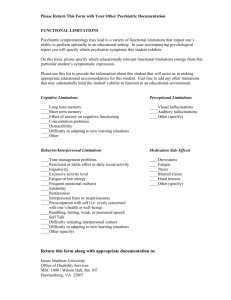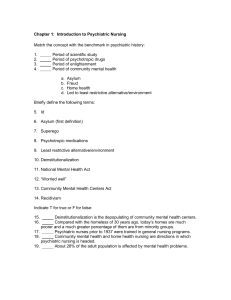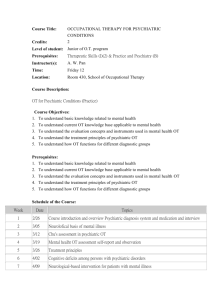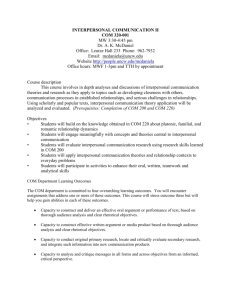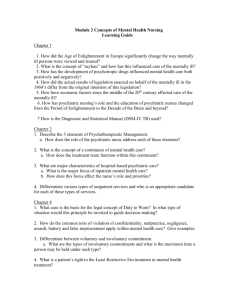Theoretic models and therapeutic strategies
advertisement
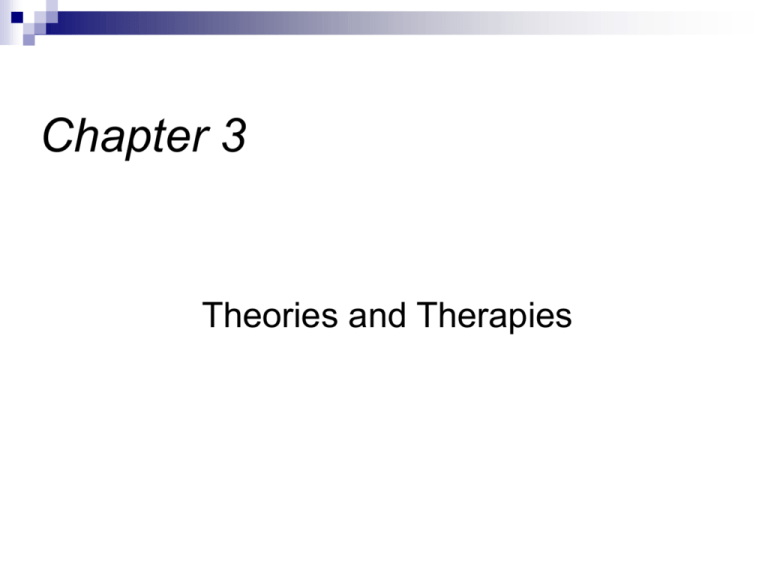
Chapter 3 Theories and Therapies Mental health and illness Mental health and illness are based on both psychological and biological factors with a dynamic interplay between the two Psychotherapy: “talk therapy” – -used exclusively by early practitioners focusing on the complexity and inner workings of mind Theoretic models and therapeutic strategies provide a useful framework for the delivery of psychiatric nursing care Major theories of the psychiatric care Psychoanalytical Theory Freud (1856-1939) – the “father of psychiatry” Focus is on the understanding of the unconscious mind Based on unconscious motivations and the dynamic interplay in between: - the unconscious - primitive brain (id-pleasure seeking), - the preconscious - the sense of self (ego –defense mechanism, such as repression, denial and rationalization) -the conscious (superego-conscience) Sigmund Major theories of the psychiatric care Interpersonal Theory Ed Sullivan (1892-1949) Focuses on “here and now” and emphasizes relationships; therapist is an active participant Personality dynamics and disorders are created by social forces and interpersonal experiences Provides positive and interpersonal repairing experiences Healthy relationships are necessary for healthy personality Major theories of the psychiatric care Behavioral Theory Developed by Pavlov (1927) who is famous for investigating classical conditioning in which involuntary behavior or reflexes could be conditioned to respond to neutral stimuli (Pavlov’s dogs) This model suggests that because behavior is learned, therapy should improve behavior through rewards and reinforcement of adaptive behavior using behavioral therapy/modification Major theories of the psychiatric care Cognitive Theory (Aaron T. Beck -1963) Depression is the result of faulty thinking Cognitive Behavioral Therapy (CBT) is effective and empirically supported Helps people reorganize distorted thinking and replace it with accurate and positive thoughts Major theories of psychiatric care Cognitive Development Developed by Jean Piaget (1896-1980) Our mental representations of world (schemata) depend on the cognitive stage we have reached 3 Stages Sensorimotor stage (0-2 yrs) Preoperational stage (2-7 yrs) Concrete operational stage (7-11 yrs) Formal operational stage (11-adulthood) Major theories of psychiatric care Theory of Psychosocial Development Erik Erickson (1902-1994) described development as occurring in 8 predetermined life stages , stages whose success are related to preceding stage Psychosocial Life Stage 1. Trust v Mistrust Infancy: (0-1½ yrs) 2. Autonomy v Shame and Doubt: (1-3 yrs) 3. Initiative v Guilt Play: (3-6 yrs) 4. Industry v Inferiority School Age (5-12 yrs) 5. Identity v Role Confusion Adolescence (9-18 yrs) puberty, teens 6. Intimacy v Isolation Young Adult 18-40, courting, early parenthood 7. Generatively v Stagnation Adulthood 30-65, middle age, parenting 8. Integrity v Despair Mature Age 50+, old age, grandparents Major theories of psychiatric care Humanistic Theory Psychological science concerned with human potential for logical science concerned with the human potential for development, knowledge attainment, motivation and understanding Carl Rogers (1961): developed patient centered psychotherapy, a technique that emphasized role of pt in understanding ones own problems Abraham Maslow (1970): developed the theory of personality and motivation based on hierarchy of needs; Psychological needs, safety needs, belongingness and love needs, esteem needs, selfactualization and self-transcendent needs Major theories of psychiatric care Biological Model Dominant model for psychiatric care Belief that mental disorders have physical causes Psychopharmacology (medicine) is the primary biological treatment for mental disorders Major Classifications of medications used for psychiatric pts Antidepressants Mood Stabilizers Antipsychotics Antianxiety Psychostimulants Major theories of psychiatric care Nursing Model: Developed by Hildegard Peplau (1909-1999) Published Interpersonal Relationships in Nursing Foundation for understanding and conducting therapeutic nursing relationships Based on Sullivan’s Interpersonal Theory Peplau’s theory provides structure for how the therapeutic relationship is viewed Four phases Preinteraction Phase Orientation (Introductory) Phase Working Phase Termination (Resolution) Phase Therapies for specific populations Group therapy Provides a formal setting for this influence Derived from interpersonal theory and assumption is the interaction among participants can support or bring desired change among individual participants Offers significant interpersonal feedback fro multiple people Group is defined as a gathering of 2 or more individuals who share a common purpose and meet over a substantial time period in a face to face interaction to achieve an identifiable goal Therapies for specific populations Group Therapy Setting: room, privacy, seating Group Development: 5 stages: forming, storming, norming, performing and adjourning Roles of Group Members: task, maintenance and individual Roles of Group Leader: multiple roles in starting, maintaining and terminating a group. Leadership style depends on the group type Types of Groups: education, tasks, support and therapy Therapies for specific populations Roles of Nurses Psychoeducational groups; teach about a specific somatic or psychological subject Medication education group Dual diagnosis group Addiction recovery group Symptom management group Stress management group Multifamily group Self help group Therapeutic Milieu Healthy environment +healthy social structure Therapies for specific population Family Therapy Based on various theoretical models and aims to decrease emotional reactivity among family members and encourage differentiation among individual family members
